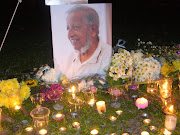In other words, the use of patriotism as a political sword or a political shield is as old as the Republic.
Most Americans understood that dissent does not make one unpatriotic.
None of us expect that arguments about patriotism will, or should, vanish entirely; after all, when we argue about patriotism, we are arguing about who we are as a country, and more importantly, who we should be. But surely we can agree that no party or political philosophy has a monopoly on patriotism. And surely we can arrive at a definition of patriotism that, however rough and imperfect, captures the best of America's common spirit.
For me, as for most Americans, patriotism starts as a gut instinct, a loyalty and love for country rooted in my earliest memories. I'm not just talking about the recitations of the Pledge of Allegiance or the Thanksgiving pageants at school or the fireworks on the Fourth of July, as wonderful as those things may be. Rather, I'm referring to the way the American ideal wove its way throughout the lessons my family taught me as a child.
I remember, when living for four years in Indonesia as a child, listening to my mother reading me the first lines of the Declaration of Independence – "We hold these truths to be self-evident, that all men are created equal. That they are endowed by their Creator with certain unalienable rights, that among these are Life, Liberty and the pursuit of Happiness." I remember her explaining how this declaration applied to every American, black and white and brown alike; how those words, and words of the United States Constitution, protected us from the injustices that we witnessed other people suffering during those years abroad. That's my idea of America.
I came to understand that our revolution was waged for the sake of that belief – that we could be governed by laws, not men; that we could be equal in the eyes of those laws; that we could be free to say what we want and assemble with whomever we want and worship as we please; that we could have the right to pursue our individual dreams but the obligation to help our fellow citizens pursue theirs.
That is why, for me, patriotism is always more than just loyalty to a place on a map or a certain kind of people. Instead, it is also loyalty to America's ideals – ideals for which anyone can sacrifice, or defend, or give their last full measure of devotion. I believe it is this loyalty that allows a country teeming with different races and ethnicities, religions and customs, to come together as one.
Of course, precisely because America isn't perfect, precisely because our ideals constantly demand more from us, patriotism can never be defined as loyalty to any particular leader or government or policy. As Mark Twain, that greatest of American satirists and proud son of Missouri, once wrote, "Patriotism is supporting your country all the time, and your government when it deserves it." We may hope that our leaders and our government stand up for our ideals, and there are many times in our history when that's occurred. But when our laws, our leaders or our government are out of alignment with our ideals, then the dissent of ordinary Americans may prove to be one of the truest expression of patriotism.
Recognizing a wrong being committed in this country's name; insisting that we deliver on the promise of our Constitution – these are the acts of patriots, men and women who are defending that which is best in America. And we should never forget that – especially when we disagree with them; especially when they make us uncomfortable with their words.
Beyond a loyalty to America's ideals, beyond a willingness to dissent on behalf of those ideals, I also believe that patriotism must, if it is to mean anything, involve the willingness to sacrifice – to give up something we value on behalf of a larger cause.
We must remember, though, that true patriotism cannot be forced or legislated with a mere set of government programs. Instead, it must reside in the hearts of our people, and cultivated in the heart of our culture, and nurtured in the hearts of our children.
It is up to us, then, to teach them. It is up to us to teach them that even though we have faced great challenges and made our share of mistakes, we have always been able to come together and make this nation stronger, and more prosperous, and more united, and more just. It is up to us to teach them that America has been a force for good in the world, and that other nations and other people have looked to us as the last, best hope of Earth. It is up to us to teach them that it is good to give back to one's community; that it is honorable to serve in the military; that it is vital to participate in our democracy and make our voices heard.
Our greatest leaders have always understood this. They've defined patriotism with an eye toward posterity. George Washington is rightly revered for his leadership of the Continental Army, but one of his greatest acts of patriotism was his insistence on stepping down after two terms, thereby setting a pattern for those that would follow, reminding future presidents that this is a government of and by and for the people.
Abraham Lincoln did not simply win a war or hold the Union together. In his unwillingness to demonize those against whom he fought; in his refusal to succumb to either the hatred or self-righteousness that war can unleash; in his ultimate insistence that in the aftermath of war the nation would no longer remain half slave and half free; and his trust in the better angels of our nature – he displayed the wisdom and courage that sets a standard for patriotism.
Harry S Truman, who sat in the White House during his final days in office and said in his Farewell Address: "When Franklin Roosevelt died, I felt there must be a million men better qualified than I, to take up the Presidential task…But through all of it, through all the years I have worked here in this room, I have been well aware than I did not really work alone – that you were working with me. No President could ever hope to lead our country, or to sustain the burdens of this office, save the people helped with their support."














No comments:
Post a Comment